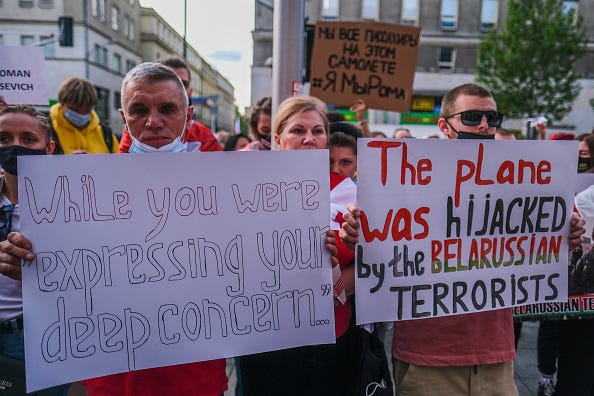“It was straight out of a film, a horror film,” said Nikos Petalis, a passenger heading from Athens to Vilnius on Ryanair FR4978, recounting the plane’s hijacking on May 23 by Belarus security services. Yet the forced landing in Minsk was all too real for Belarus opposition journalist Roman Protasevich, who lives in exile in Vilnius. “They will kill me,” Protasevich told fellow passengers, shaking with fear, as the plane descended.
As the former editor of Belarus Telegram channels Nexta and Nexta Live, Protasevich had been an organizer of the 2020 Belarus protests against despot Alexander Lukashenko. Belarus KGB operatives used a false bomb threat to justify the emergency landing -- escorted by a MIG-29 -- so that Protasevich, who had been charged with terrorism and inciting mass riots, could be arrested in his native country. His girlfriend, Sofia Sapega, a Russian citizen, was also detained.

The audacious operation continues a history of authoritarian aggressions against exiles -- a broad category of individuals who are targeted by their governments on racial, ethnic, religious, or political grounds and must leave their homelands to avoid persecution. Here I focus on how repressive leaders have responded to exiles who speak out against their tyranny. If the exiles are prominent and can mobilize dissent at home (living abroad makes it easier to plan resistance, as Italian anti-Fascists based in Paris and enemies of Muammar Gaddafi based in Cairo knew) or can turn foreign elites against the rogue country, they often end up kidnapped and imprisoned or assassinated. The 2018 murder of the Saudi Arabian journalist Jamal Kashoggi at the Saudi consulate in Istanbul was in this tradition.
When the target is famous and has a lot of security, as Joseph Stalin’s nemesis Leon Trotsky did at his villa in Mexico, the operation must be meticulously planned. Trotsky had already escaped a machine gun attack when the Spanish Communist Ramón Mercader killed him in 1940 with an ice pick on Stalin’s behalf. Augusto Pinochet also made use of foreign agents to execute his most spectacular crimes in this vein. The American terrorist Michael Townley, who worked for Pinochet’s DINA secret police, planted a car bomb in Buenos Aires in 1974 to kill exiled Pinochet critic General Carlos Prats. Another car bomb two years later murdered the diplomat and politician Orlando Letelier, who mobilized international opinion against the junta from Washington D.C.

Such operations not only silence critics and “set an example” (a favorite autocratic game), but have value as propaganda. They demonstrate the long arm of the state and feed the myth of the leader’s omnipotence. They also reflect personality traits, like an obsession with exacting revenge, that typify leaders like Lukashenko. For the strongman, those exiled nationals are “his,” no matter where they live in the world, and for 100 years he has tenaciously pursued and punished them.
Poison figures in the history of exiles’ murders. Putin used it against Alexander Litvinenko, a former FSB agent turned whistleblower, who died after ingesting Polonium 210-laced tea in London in 2006. Gaddafi, too, used poison during his early 1980s campaign to eliminate “stray dogs” (exiles who criticized him or were members of foreign-based resistance networks), experimenting with thallium-laced peanuts.
Yet Gaddafi preferred to have his critics gunned down in order to make an immediate public statement, whether in Rome (Mohamed Salem Rtemi) or London (the BBC Arabic Service journalist Muhammad Mustafa Ramadhan). The CIA may have seen Gaddafi's exiled opponents as “an irritant but not a threat," but Gaddafi wanted to kill or imprison every last one of them. In the first decade of the 2000s, the United States and many other countries acquiesced to his demands for rendition of their Libyan prisoners, helping him towards that goal.
Recep Tayyip Erdogan has taken a different approach to getting “his” bodies back: kidnapping. At least 80 Turkish citizens have been abducted from more than 18 countries over the last few years and brought to Turkish prisons. Many are accused of being associates of Fethullah Gülen, the cleric in exile in Pennsylvania accused by Erdogan of planning the 2016 coup against him. Erdogan recalls Gaddafi’s single-mindedness in pursuing his enemies. “No matter where they run or how much they run, we will go after them,” Erdogan said of Gülen’s supporters in 2018. Erdogan revoked the passport of the Turkish basketball star and Erdogan critic Enes Kanter, who has played for American teams since 2011, branding him as a terrorist. He also imprisoned Kanter’s father. Going after exiles’ relatives who remain in the country is a common strongman strategy.
We don't know what will ultimately happen to Protasevich, who appeared in a May 24 video to acknowledge his part in the protests and declare that he was being treated fairly. Such “confessions” intend to manipulate public opinion to justify whatever punishment will be meted out. As Protasevich’s ordeal unfolds, we may keep in mind the autocrat's goal to instill fear in his people, wherever they reside, the better to keep them silent about his crimes.




Ben Rhodes former NSA chief said if they can gett away with this hijack-kidnap 'NO ONE IS SAFE".
I’m not sure if it’s me, the news, the insanity of Majorie Taylor Green or a combination of all three, but today’s post just filled me with more dread than usual. The fact that a commercial airliner was forced down because some dictator was upset, contravenes so many laws, it’s unreal. Ruth, you do a great job of crystallizing information and putting an historical context to it all. I wish that people could view your videos as much as they view Pewdiepie or some other gamer/influencer. Your information is so much more vital. I somehow feel you’re going to need to release Strongman Part Deux - The Fascist Takeover of the USA on January 6, 2025. It sure seems things are spinning out of control.